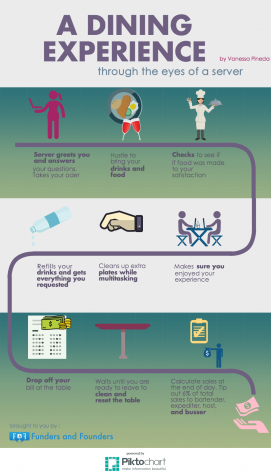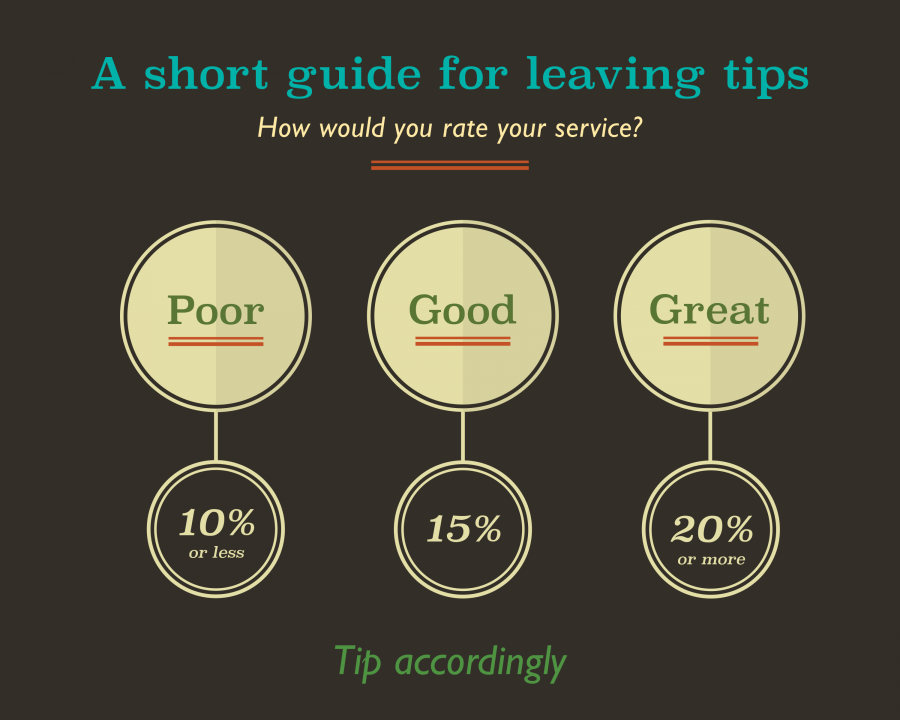Recognize your server’s efforts with a tip
A server does more than write down customer orders and take food and beverages out to them. Anyone who has ever been a server knows that serving demands incredible multitasking abilities, stress-coping skills, the ability to hustle around the restaurant without an opportunity to take bathroom breaks and have to smile even when you are having a horrible day.
Should restaurant servers receive a tip? Some people don’t think so. But as a server with experience and knowledge of how physically and emotionally draining it is, I firmly believe that tipping servers is necessary and practical.
Some restaurant-goers fail to realize the type of luxury that being served truly is. To be able to dine in a restaurant, to have someone check up on you and meet all of your meal and service requests is a complete privilege and this should be recognized in the form of a tip.
Many believe that the restaurant industry should offer its employees higher wages instead of relying on customers to tip their employees for them. However, serving does not require a college degree or even a high school diploma.
Serving does not require a credential that your employer can assess and to determine your wage. Instead, serving is a physically and emotionally draining job that can take a huge toll on a person’s well being and health.
No one forced you to go out and eat. You could have stayed home and cooked for yourself, but instead you opted to dine out. You’ve put the responsibility of a meal into someone else’s hands. You put the responsibility into my hands and I will do my best to make sure you enjoy your visit.
I truly care for my tables and want them to have a pleasant experience. You’re not tipping me because I make minimum wage and think I deserve a higher salary, you are tipping me because I am providing a full service for you — it’s a form of gratitude.
When your bacon comes out and it isn’t crispy enough, I send it back to the kitchen and tell them I need crispy bacon immediately. When your Bloody Mary is too spicy, I go to the bar and ask for some tomato juice, free of charge. If your child spills water on the table I hurry over with towels, wipe up the spill and change the tablecloth.
When you go to eat at a restaurant you do not have to get out of your seat during your meal. Everything is done for you. Someone even cleans up after you.
Guests in a restaurant should tip 15 percent of their bill for a good experience, 20 percent for great service and 10 percent or less if the service was poor.
 As a server I have to tip out 6.25 percent of my total sales. This means if I sell $1,450, which includes food, drinks, desserts, etc, I have to tip out the bartender, food expeditor, bussers and the hostess based on that number. The bartender gets 1.5 percent of my total sales, the food expeditor 1 percent, the bussers 3.25 percent, and the hostess .05 percent. So if I get 20 percent in tips, I will have made a total of $290, then after tipping out $90, I will walk away with $200 — after a busy brunch. However, this is only true if guests tip me 20 percent on every tab. If tables tip less than 10 percent on a large bill, I lose money when tipping on my total sales.
As a server I have to tip out 6.25 percent of my total sales. This means if I sell $1,450, which includes food, drinks, desserts, etc, I have to tip out the bartender, food expeditor, bussers and the hostess based on that number. The bartender gets 1.5 percent of my total sales, the food expeditor 1 percent, the bussers 3.25 percent, and the hostess .05 percent. So if I get 20 percent in tips, I will have made a total of $290, then after tipping out $90, I will walk away with $200 — after a busy brunch. However, this is only true if guests tip me 20 percent on every tab. If tables tip less than 10 percent on a large bill, I lose money when tipping on my total sales.
Many don’t see the ugly truth of the restaurant industry. Guests can be very rude and have a lack of respect for their servers. Some people treat servers as if they are just the help and not as human beings, but they are there to ensure you have a great dinning experience.
Next time you go out to eat and send back your eggs because you asked for over medium but think they are too runny; remember your server is already multitasking, stressing over other issues and hustling to make sure you are satisfied with your meal. Tipping is not about paying the server a higher wage, it’s about acknowledging their effort and service.








